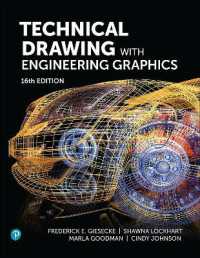- ホーム
- > 洋書
- > ドイツ書
- > Social Sciences, Jurisprudence & Economy
- > Education Science / Pedagogic
- > adult education
Full Description
Academic Integrity in Vocational and Polytechnic Education addresses educative approaches to support academic integrity in hands-on and applied learning environments with a focus on practitioner experiences. Building on systems theory, the book documents multi-stakeholder perspectives of institutional leaders, department specialists, and individual champions of academic integrity. Readers will be introduced to the 4M framework, which views academic integrity as a responsibility at all levels of the institution and connects to the broader community and professional industries. Each chapter is set in an applied context and lends to the philosophy of a shared responsibility in growing the institutional culture of academic integrity.
This book offers insights from the perspectives of leaders, faculty, and support staff, as authors describe challenges and solutions to upholding academic integrity in short term programming geared toward employment readiness. Although the work is about vocational and polytechnic education written by members of this community, it has a wider appeal across higher education due to shifting pedagogical methods that are becoming more applied and personalized. In an age of information ubiquity, where traditional learning activities such as rote memorization and essay writing do not sufficiently assess learning or prepare the learner for the workplace, educators will find unique insights from the vocational and polytechnic sector to supporting academic integrity in a changing academic landscape.
Contents
Chapter 1. Building on Strengths: Nurturing Cultures of Academic Integrity in Vocational and Polytechnic Education.- Part 1: Building and Maintaining Institutional Cultures of Academic Integrity.- Chapter 2. Successful Institutional Change: Lessons on Building a Culture of Academic Integrity.- Chapter 3. Building an Academic Integrity Plan: Our Journey at a Mid-Sized Polytechnic.- Chapter 4. Shifting Perspectives: Academic Integrity in Vocational Education and Training (VET) in the Age of Generative Artificial Intelligence.- Chapter 5. Faculty Education on Academic Integrity: A Micro-Credential Approach.- Chapter 6. Building Relational Culture in Polytechnic Education Through Restorative Approaches to Academic Integrity.- Part II: Impact of Structure and Organization of Vocational and Polytechnic Education on Academic Integrity.- Chapter 7. Student Stress in Community Colleges: Creating Healthy, Ethical Spaces for Learning.- Chapter 8. Polytechnic Pinch Points for Academic Integrity: Reflections from Student Conduct Officers.- Chapter 9. Advocating for Fair Compensation and Employment Equity: Reducing the Burden of Academic Integrity and Misconduct Work in Colleges and Polytechnics.- Chapter 10. From Mega to Micro: Collaborative Strategies for Enhancing Academic Integrity in a College Nursing Program.- Chapter 11. Strength of Character: Upholding Academic Integrity in Canadian Military Vocational Training.- Part III: Educators Support of Academic Integrity: Vocational Training Vignettes.- Chapter 12. Student Engagement in Geomatics Engineering Technology Assessments.- Chapter 13. Exploring Collusion as a Form of Academic Misconduct in Vocational Shop Classrooms.- Chapter 14. Automation, Creativity, and Ethics: Re-framing Academic Integrity in the Training of Music Technology Professionals.- Chapter 15. When Technology Uncovers the Truth: Exploratory Meetings in Architectural Technology.- Chapter 16. English Language Support Served with Integrity: Reflections from a Hospitality and Tourism Management Workshop Facilitator.- Chapter 17. A Duty of Care in Automotive Technology.








